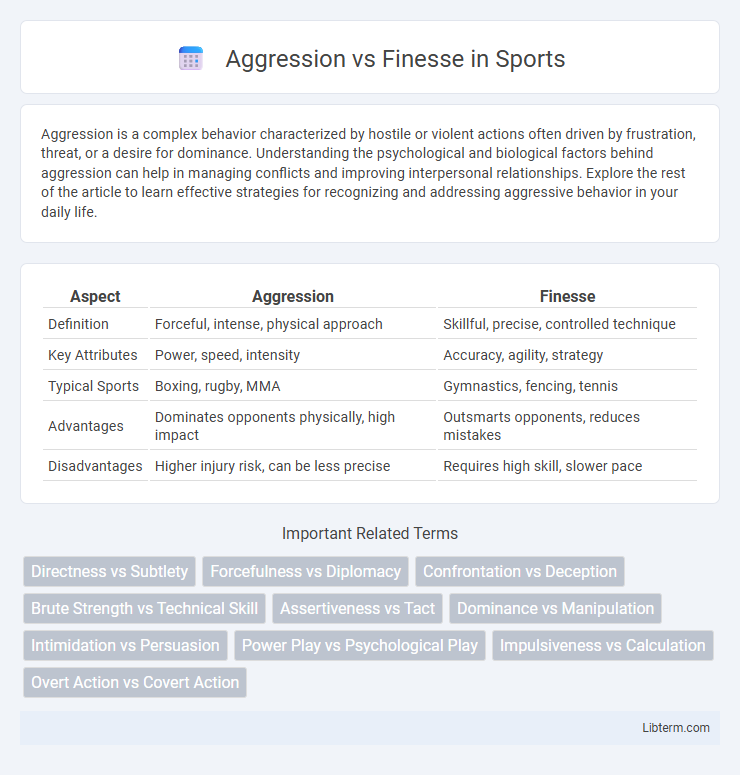Aggression is a complex behavior characterized by hostile or violent actions often driven by frustration, threat, or a desire for dominance. Understanding the psychological and biological factors behind aggression can help in managing conflicts and improving interpersonal relationships. Explore the rest of the article to learn effective strategies for recognizing and addressing aggressive behavior in your daily life.
Table of Comparison
| Aspect | Aggression | Finesse |
|---|---|---|
| Definition | Forceful, intense, physical approach | Skillful, precise, controlled technique |
| Key Attributes | Power, speed, intensity | Accuracy, agility, strategy |
| Typical Sports | Boxing, rugby, MMA | Gymnastics, fencing, tennis |
| Advantages | Dominates opponents physically, high impact | Outsmarts opponents, reduces mistakes |
| Disadvantages | Higher injury risk, can be less precise | Requires high skill, slower pace |
Understanding Aggression: Definition and Context
Aggression refers to behaviors characterized by assertiveness, dominance, and often physical or verbal force aimed at achieving a goal or defending oneself. In psychological and social contexts, aggression can be reactive, triggered by perceived threats, or proactive, planned to gain advantage. Understanding aggression involves recognizing its diverse manifestations, motivations, and the impact it has on interpersonal relationships and conflict resolution.
What Is Finesse? A Subtle Approach
Finesse represents a subtle, strategic approach characterized by precision, control, and delicate execution rather than brute force or overt aggression. It emphasizes careful manipulation, timing, and maneuvering to achieve goals with minimal conflict or resistance. This approach often leads to more sustainable success by leveraging intelligence and skill over raw power.
Core Differences Between Aggression and Finesse
Aggression emphasizes direct, forceful actions aimed at overpowering opponents, often relying on speed, power, and assertiveness to dominate the interaction. Finesse focuses on precision, subtlety, and strategic manipulation, utilizing skillful techniques and controlled movements to outsmart or outmaneuver opponents. The core difference lies in aggression's raw intensity versus finesse's calculated skill, shaping contrasting approaches in competitive or combative scenarios.
Psychological Roots of Aggression and Finesse
Aggression often stems from primal psychological roots such as frustration, perceived threats, or the need for dominance, activating the amygdala and triggering fight-or-flight responses. In contrast, finesse arises from higher-order cognitive processes involving the prefrontal cortex, promoting strategic thinking, emotional regulation, and social intelligence. Understanding these neural and cognitive mechanisms highlights the fundamental differences between impulsive aggressive behaviors and deliberate, skillful finesse in human interactions.
Aggression vs Finesse in Conflict Resolution
Aggression in conflict resolution often escalates tensions and leads to defensive responses, while finesse promotes understanding and collaboration through tactful communication and emotional intelligence. Employing finesse enables problem-solving that respects all parties' perspectives and fosters long-term relationships, contrasting with aggression's tendency to create adversarial dynamics. Effective conflict resolution balances assertiveness with finesse to achieve practical solutions without resorting to hostility.
Impacts on Team Dynamics and Collaboration
Aggression in team settings often leads to dominance struggles that hinder open communication and reduce collaborative problem-solving, impacting overall team synergy negatively. Finesse, characterized by tactful interaction and emotional intelligence, enhances trust and empathy, fostering a more inclusive environment conducive to innovation. Teams emphasizing finesse experience higher morale and fluid coordination, improving collective performance and project outcomes.
Real-Life Examples: Aggression Versus Finesse in Action
Aggression in real-life scenarios often manifests in sports like boxing, where relentless pressure and power punches overwhelm opponents. In contrast, finesse is exemplified by chess grandmasters employing strategic moves and careful planning to outmaneuver challengers. These examples highlight that while aggression relies on force and intensity, finesse depends on skillful precision and tactical intelligence.
Choosing the Right Approach: When to Use Each
Aggression proves effective in fast-paced, high-stakes situations demanding immediate results, such as competitive sports or crisis management, where decisive actions can shift outcomes rapidly. Finesse is optimal when precision, subtlety, and strategic planning are crucial, especially in negotiation, creative industries, or technical problem-solving requiring careful execution and attention to detail. Selecting the right approach depends on contextual factors like time sensitivity, risk tolerance, and the desired balance between impact and craftsmanship.
The Advantages and Disadvantages of Aggression vs Finesse
Aggression in competitive environments offers the advantage of overwhelming opponents through speed and force, often leading to quick victories, but it risks high energy expenditure and increased mistakes. Finesse relies on precision, strategy, and careful execution, allowing for more controlled and calculated moves that minimize risk, though it can result in slower progress and vulnerability to aggressive tactics. Balancing aggression and finesse is crucial, as overemphasis on either can undermine overall performance and outcome effectiveness.
Cultivating Balance: Mastering Both Aggression and Finesse
Cultivating balance between aggression and finesse enhances strategic decision-making in competitive environments by combining assertive actions with precise, calculated moves. Mastery of both traits enables individuals to adapt fluidly, leveraging aggression to seize opportunities while applying finesse to maintain control and minimize errors. This synergy improves overall performance, fostering resilience and sustained success in dynamic scenarios.
Aggression Infographic

 libterm.com
libterm.com